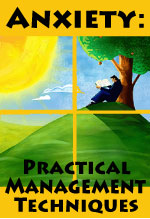Families for Depression Awareness (FFDA) is hosting a free webinar for those interested in learning more about teen anxiety on September 25, 2019 at 7:00 pm ET (4:00 pm PT).
Nearly one in three adolescents meet the criteria for an anxiety disorder by the age of 18. Sadly, 80% of youth diagnosed with anxiety are not getting the treatment they need. Caring adults can make a difference by learning to recognize the signs and intervening before anxiety takes over a teen’s life or leads to depression.
In this webinar, Lisa M. Schab, LCSW, a practicing psychotherapist and international best-selling author, will discuss the symptoms of an anxiety disorder, anxiety management skills adults can practice with youth, and ways adults can encourage teens to be a part of choosing treatment options.
We built in extra time for questions and answers! Join our 75-minute webinar live or watch on demand after it airs. Register today to submit your questions for our featured presenter, Lisa M. Schab, LCSW.
Featured Speakers
- Lisa M. Schab, LCSW, is a psychotherapist and author of 18 self-help books for children, teens, and adults, including Put Your Worries Here: A Creative Journal for Teens With Anxiety, and the international best-sellers, The Anxiety Workbook for Teens and The Self-Esteem Workbook for Teens. Lisa’s professional training courses are available for continuing education credit through Professional Development Resources (www.pdresources.org). She has been interviewed for articles appearing in The New York Times, Scholastic Choices Magazine, Teen Vogue, Psych Central, Today’s Parent, and The Mother Company, among others. She has also authored regular columns on Tweens & Teens for Chicago Parent Magazine and Healthy Families for Sun Newspapers. Lisa holds a Bachelor of Science degree in interpersonal communications from Northwestern University and a master’s degree in clinical social work from Loyola University Chicago. She is a member of the National Association of Social Workers (NASW) and maintains a private counseling practice in the greater Chicago area. More information is available at www.lisamschabooks.com.
- Valerie Cordero is Co-Executive Director of Families for Depression Awareness. Valerie joined the FFDA staff in 2010 and has held positions in administration, programs, and development. She received her BA from Spelman College and earned her Masters and PhD in Ethnomusicology from the University of California at Los Angeles. Valerie is based in FFDA’s Nashville office.














